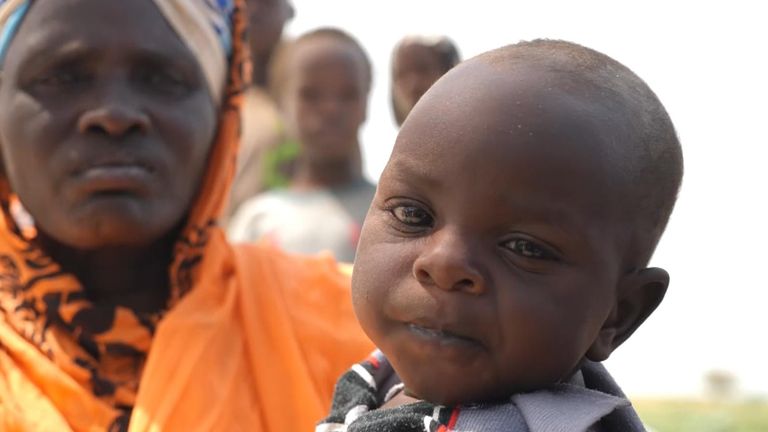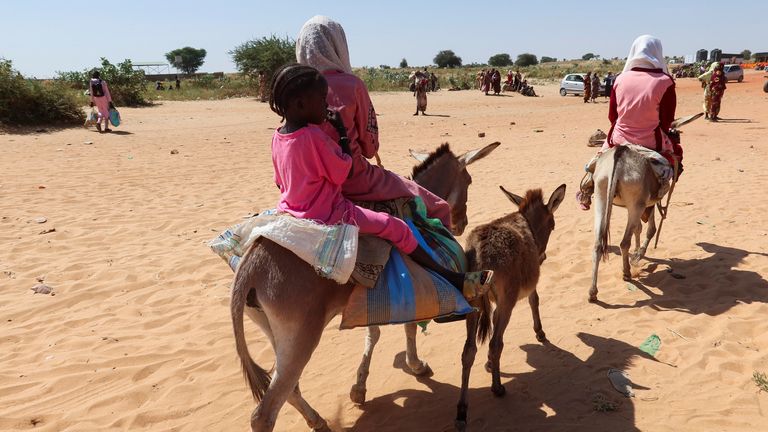Three out of four army headquarters in each of Darfur’s state capitals have fallen to the Rapid Support Forces (RSF) in Sudan – pushing thousands of people further into peril.
Among the thousands crossing the border into Chad so far this month to flee the violence are many mothers and children with no possessions, according to charity groups.
The RSF gains are the latest harrowing developments in more than half a year of fighting between the Darfur-born “janjaweed” militia turned paramilitary group and their former security partners and the national army, the Sudanese Armed Forces (SAF).
Clashes erupted earlier this year between the RSF and the SAF in a fight for political power that has killed thousands of people.
As the RSF captured the 15th infantry division army headquarters in Ardamata – a suburb of the West Darfur capital Al Geneina, home to the city’s barracks and a camp for internally displaced people – a full-blown siege was under way.
There are videos of the RSF rounding up army soldiers – along with footage of them whipping men and young boys and beating them with rifles.
“Sons of b*****!” they yell, and the dust rises as they deliver more blows.
Various human rights monitors from Darfur confirmed that the victims of violence in this particular video were civilians held in the Ardamata area – and punished on the basis of their Masalit tribe and assumed affinity with the army.
‘No one could go in or out’
Voice notes exclusively shared with Sky News – recorded in Al Geneina on the day – detail the siege conditions imposed by the RSF and allied Arab militias on the civilian population as they rounded up army soldiers on 1 November.
“The army is surrendering and asking for guarantees so that they can leave,” says one Al Geneina resident.
They added: “But the Arabs said they won’t let the head of army intelligence go even if he surrenders and said he caused a lot of problems for them and many died.”
Another resident describes the lockdown.
“The people who could escape walked by foot from Ardamata to Al Geneina [city].
“But between afternoon and sunset prayer, they closed the road and whoever was in stayed in – and whoever was out stayed out – no one could go in or out.”
She goes on to list the roads that were closed off.
“Um Duweim Way was closed. The way to Durti was also closed and they beat people up and took their phones,” she says.
“The only way was through Tile’a but some people also said it is closed and they are looting people who try and take that way.”
People have been heading across the border to Chad to escape the violence
Thousands forced to flee across border with nothing
Testimony shared by another Al Geneina resident at the time via text says “the 15th infantry division is now besieged from every direction”.
Some civilians and dozens of troops were eventually released and fled to Chad for safety where they laid down their arms.
The border authority told Sky News they were absorbed by the long-established Sudan-Chad joint border force.
Medecins Sans Frontieres has said that 7,000 people crossed the border from West Darfur to eastern Chad in the first three days of November alone.
Many of them are mothers and children who fled with nothing.
“The men are definitely not allowed to leave so they tried to get the women out,” says one of the residents via a voice note.
Multiple sources in Al Geneina say that hundreds were killed during the takeover, though the final number of deaths is unknown and difficult to measure.
Please use Chrome browser for a more accessible video player

4:48
Thousands flee the war in Sudan
‘They use sexual violence against women’
The siege of Ardamata by the RSF is almost a replica of their siege of Al Geneina on 15 June that led to a city-wide massacre.
Sky News was able to verify mass graves where bodies were dumped in the aftermath.
A human rights defender and researcher of gender-based violence from Al Geneina, who fled after the June massacre, says this pattern is a pathway to increased sexual assaults on women.
“After these men are executed, there are a lot of widowed women who are exposed,” she says on the condition of anonymity.
“What I saw from these militias is that they use sexual violence against women – young girls and even the elderly – who are also whipped by the RSF and displaced en masse.”
Several women and girls have shared horrifying experiences of sexual assault with her since the war started on 15 April.
“The women being harmed by the RSF cannot now be left to their protection,” she added.
Read more:
Sudan’s escalating conflict sees Khartoum descend into chaos
Refugees with gunshot wounds stream in from Darfur

Mothers and children have been leaving Darfur with hardly any possessions
Entire neighbourhoods surrounded by fighting despite peace talks
In Khartoum, Sudan’s capital, entire neighbourhoods in Omdurman and Bahri have been besieged and cut off from food, water and electricity.
They are surrounded by fighting and RSF positions, with no humanitarian corridors allowing for entry of aid or medical care.
Some concerned family members have not been able to reach loved ones there in two weeks.
Shelling by the RSF and army airstrikes have been killing innocent civilians in the capital since the early days of the war.
Peace talks in Jeddah have failed to produce a ceasefire agreement between the army and RSF that would provide much-needed safety and relief.
Both sides have announced a commitment to aid access, a UN-led humanitarian forum and a separate communication mechanism.
However, these outcomes carry little credence as fighting continues on the ground and after several false ceasefire declarations made early in the war.
On 11 October, Sudan’s UN representative, aligned with the army, voted no on a UN Human Rights Council vote on a fact-finding mission to investigate abuses committed during this conflict.







